Transgender student Gavin Grimm has just chalked up another victory in his years-long challenge to the Gloucester County School Board’s policy requiring students to use the restrooms matching their biological sex.

Grimm’s win, which follows on the heels of a U.S. Supreme Court decision extending Title VII of the Civil Right Act of 1964’s protections to LGBTQ employees, marks yet another step in the movement to accord full equality to the community and has significant ramifications for all employers.
Litigation
Grimm’s victory occurred on August 26, 2020, when the Richmond-based U.S. 4th Circuit Court of Appeals affirmed the 2019 ruling of U.S. District Court Judge Arenda L. Wright that the school board’s policy is unconstitutional and violates federal education law.
The decision is the most recent in litigation Grimm, a transgender male, filed against the board in 2014. His suit claims the board’s policy discriminates against him on the basis of sex in violation of the Equal Protection Clause of the U.S. Constitution and Title IX of the Education Amendments of 1972.
After several rounds in the district court and an appeal to the 4th Circuit, Grimm’s case was primed to be heard by the U.S. Supreme Court in 2018. That never occurred, however, because the Trump administration reversed Obama-era guidance advising schools to allow students to use the restroom corresponding to their gender identity. As a consequence, the case was returned to the lower courts to address the matter.
4th Circuit’s Decision
In a 2-to-1 decision, a three-judge panel of the 4th Circuit found the school board’s policy treated Grimm—who was born a girl but identifies as male—“worse than students with whom he was similarly situated because he alone could not use the restroom corresponding with his gender. Unlike the other boys, he had to use either the girls’ restroom or a single-stall option.”
The court unequivocally dismissed the board’s arguments asserting nontransgender students’ safety and privacy concerns, likening the stances to similar arguments used to justify racial segregation.
Circuit Judge James A. Wynn’s concurring opinion described the policy as “so arbitrary that it cannot provide consistent treatment among the very individuals it discriminates against” and instead “guaranteed a particular outcome: that one student would be unable to use the boys’ restroom.” Judge Wynn went on to describe the board’s policy as bearing an “eerie similarity to the stigmatic discrimination in the separate-but-equal context.”
The 4th Circuit also addressed the board’s refusal to updated Grimm’s school records after he presented it with an amended birth certificate identifying his sex as male. Writing for the majority, Circuit Judge Henry F. Floyd concluded the board’s refusal harmed Grimm and treated him worse than other similarly situated students, “whose records reflect their correct sex.”
The 4th Circuit’s decision, however, may not be the end of the case. The school board hasn’t yet stated whether it plans to ask all the judges on the 4th Circuit to consider the matter or possibly appeal the decision to the U.S. Supreme Court.
Importance of Decision
Grimm, who graduated from Gloucester County High School in 2017, describes the 4th Circuit’s decision as a major win for not only himself but also the entire transgender community. At the very least, the ruling will dictate transgender rights in the states within the court’s jurisdiction: Maryland, Virginia, West Virginia, and North and South Carolina.
Most important, Grimm’s victory comes in the wake of the U.S. Supreme Court’s recent decision in a trio of cases, Bostock v. Clayton County Georgia, Harris Funeral Homes v. EEOC, and Altitude Express, Inc. v. Zarda. In those cases, the Court extended Title VII’s protections to LGBTQ employees who had been terminated because of their sexual orientation or gender identity.
Title VII bears significant similarity to Title IX. Consequently, interpretation and application of one statute is often used to inform the interpretation and application of the other. So, the 4th Circuit’s decision in Grimm’s case signals the likely outcome of future disputes over transgender rights in the employment context, such as restroom access and dress codes.
Employers in jurisdictions covered by the 4th Circuit should get prepared to meet their transgender employees’ needs. Given the rapidly evolving area of the law, you should consult with experienced employment counsel to address areas of potential inequality in your policies and practices. Don’t wait for a discrimination charge or lawsuit to be filed.
Editor’s note: You can find articles discussing earlier court decisions in Gavin Grimm’s case in the Virginia Employment Law Letter at “U.S. Supreme Court puts transgender bathroom case on hold,” August 2016; “VA student’s transgender bathroom case will not pass ‘Go’ . . . yet,”, May 2017; “4th Circuit ruling favors transgender student,” May 2017; “Virginia Bathroom Gender Dispute Update: 4th Circuit to Answer Critical Question,” August 2018; “What’s the Meaning of ‘Sex’? Supreme Court Will Finally Provide the Answer”, and November 2019. For a discussion of the Supreme Court decisions, see “Supreme Court Adopts Broad Definition of Sex in ‘Historic’ Title VII Ruling.”
Rachael Loughlin is an associate in the Richmond, Virginia office of O’Hagan Meyer. You can reach her at rloughlin@ohaganmeyer.com.
